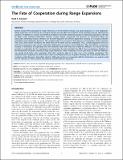The Fate of Cooperation during Range Expansions
Author(s)
Korolev, Kirill Sergeevich
DownloadKorolev-2013-The fate of cooperat.pdf (949.7Kb)
PUBLISHER_CC
Publisher with Creative Commons License
Creative Commons Attribution
Terms of use
Metadata
Show full item recordAbstract
Species expand their geographical ranges following an environmental change, long range dispersal, or a new adaptation. Range expansions not only bring an ecological change, but also affect the evolution of the expanding species. Although the dynamics of deleterious, neutral, and beneficial mutations have been extensively studied in expanding populations, the fate of alleles under frequency-dependent selection remains largely unexplored. The dynamics of cooperative alleles are particularly interesting because selection can be both frequency and density dependent, resulting in a coupling between population and evolutionary dynamics. This coupling leads to an increase in the frequency of cooperators at the expansion front, and, under certain conditions, the entire front can be taken over by cooperators. Thus, a mixed population wave can split into an expansion wave of only cooperators followed by an invasion wave of defectors. After the splitting, cooperators increase in abundance by expanding into new territories faster than they are invaded by defectors. Our results not only provide an explanation for the maintenance of cooperation but also elucidate the effect of eco-evolutionary feedback on the maintenance of genetic diversity during range expansions. When cooperators do not split away, we find that defectors can spread much faster with cooperators than they would be able to on their own or by invading cooperators. This enhanced rate of expansion in mixed waves could counterbalance the loss of genetic diversity due to the founder effect for mutations under frequency-dependent selection. Although we focus on cooperator-defector interactions, our analysis could also be relevant for other systems described by reaction-diffusion equations.
Date issued
2013-03Department
Massachusetts Institute of Technology. Department of PhysicsJournal
PLoS Computational Biology
Publisher
Public Library of Science
Citation
Korolev, Kirill S. The Fate of Cooperation During Range Expansions. Edited by Carl T. Bergstrom. PLoS Computational Biology 9, no. 3 (March 28, 2013):
Version: Final published version
ISSN
1553-7358